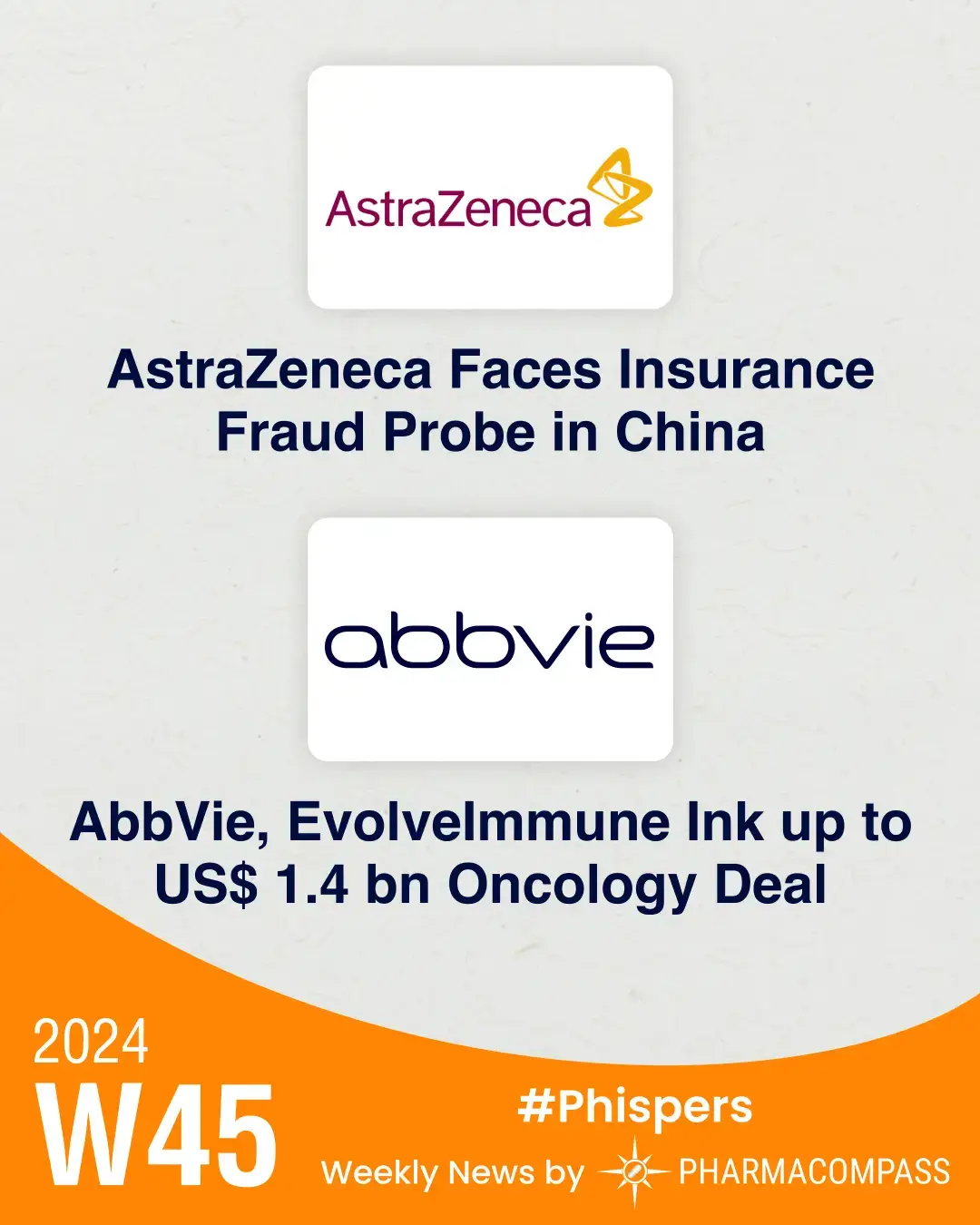
By PharmaCompass
2024-11-07
Impressions: 940 (Article) || 19 (Video)
In this week’s Phispers, AstraZeneca faces a major crisis in China as its president Leon Wang is under investigation in what’s being described as the largest insurance fraud case in years concerning the country’s pharmaceutical sector.
In deals, AbbVie bolstered its oncology portfolio through a potential US$ 1.4 billion collaboration with EvolveImmune Therapeutics.
Journey Medical and Dr. Reddy’s skin treatment Emrosi received approval from the US Food and Drug Administration (FDA). The innovative oral antibiotic targets inflammatory lesions associated with rosacea.
In news from clinical trials, Intra-Cellular Therapies reported remarkable results from a late-stage trial of its schizophrenia drug Caplyta. Novo Nordisk discontinued its late-stage kidney disease drug, ocedurenone, following a disappointing phase 3 trial.
Meanwhile, Lexicon Pharmaceuticals faced disappointment as an FDA advisory committee voted 11-3 against its type 1 diabetes drug Zynquista.
The European Commission slapped Israel’s Teva Pharmaceuticals with a hefty € 462.6 million (US$ 503 million) fine for allegedly manipulating market competition for its multiple sclerosis drug Copaxone. And Indian pharmaceutical manufacturer Shilpa Medicare received a Form 483 with four observations following an FDA inspection at its Bangalore facility.
Astra’s China chief being probed for ‘largest insurance fraud’ in years, say reports
AstraZeneca came under intense scrutiny as its China president Leon Wang faced an investigation for an alleged fraud. A report has suggested that dozens of senior executives at the company could be implicated in what is being described as the largest case of insurance fraud in years in China’s pharmaceutical sector. Wang was “cooperating with an ongoing investigation by Chinese authorities,” the British-Swedish drugmaker has said. A report by Chinese publication Yicai indicated that medical representatives have previously been caught falsifying prescriptions for AstraZeneca’s lung cancer medication, Tagrisso (osimertinib), enabling patients to purchase it through the state’s medical insurance program. In a recent update, Astra said Wang has been detained by Chinese authorities, and the company does not believe his detention was linked to a large health insurance fraud case involving the company. Astra is the biggest foreign pharma company in China, accounting for 13 percent of the drugmaker’s annual revenue in 2023.
FDA approves Journey Medical-Dr Reddy’s skin condition drug for rosacea
FDA has approved Journey Medical’s Emrosi (minocycline hydrochloride), an innovative oral antibiotic developed in partnership with Dr. Reddy’s Laboratories. This new medication targets inflammatory lesions associated with rosacea, a chronic skin condition characterized by persistent redness and small pus-filled bumps affecting millions of Americans. The drug’s approval follows successful completion of two pivotal, 16-week, phase 3 clinical trials, where Emrosi demonstrated superior efficacy compared to both placebo and the current standard-of-care, Galderma’s Oracea (doxycycline) capsules.
FDA panel votes against Lexicon’s type 1 diabetes drug Zynquista: An FDA advisory committee voted 11-3 against Lexicon Pharmaceuticals’ drug, Zynquista (sotagliflozin), as an adjunct therapy to insulin for managing type 1 diabetes in adults with chronic kidney disease. The panel concluded that the benefits of the drug did not outweigh its risks, particularly due to concerns of developing diabetic ketoacidosis, a serious condition that can arise in patients with type 1 diabetes. This decision marks another hurdle for Lexicon, which has struggled to gain regulatory approval for sotagliflozin in the past. The FDA is expected to make a final decision on the application by December 20.
Intra-Cellular schizo drug cuts risk of relapse by impressive 63% in late-stage trial
Intra-Cellular Therapies has announced promising results from a late-stage trial of its schizophrenia drug, Caplyta (lumateperone), which successfully met its primary goal of preventing relapses in patients. Caplyta is already approved for treating schizophrenia. The trial demonstrated a remarkable 63 percent reduction in the risk of relapse compared to a placebo, highlighting the drug’s potential to significantly improve management of this challenging condition. During the study, only 16.4 percent of patients on lumateperone experienced relapses, compared to 38.6 percent in the placebo group.
AbbVie, EvolveImmune ink potential US$ 1.4 bn deal for cancer biotherapeutics
AbbVie has partnered with EvolveImmune Therapeutics in a potential US$ 1.4 billion deal (plus US$ 65 million upfront) to develop next-generation cancer biotherapeutics. The collaboration will leverage EvolveImmune’s innovative T-cell engager platform to create multi-specific biologics targeting various oncology indications. EvolveImmune’s platform is designed to make T-cells more effective at fighting cancer by enhancing their ability to target and kill tumor cells. The aim is to treat both solid tumors and blood cancers that have been difficult to target with existing therapies.
Novo scraps kidney disease drug after trial failure: Novo Nordisk has officially discontinued its late-stage kidney disease drug, ocedurenone, following a disappointing phase 3 trial that failed to meet its primary endpoint. Acquired in a US$ 1.3 billion deal from KBP Biosciences, ocedurenone was intended to compete with Bayer’s approved chronic kidney disease drug, Kerendia (finerenone). However, the trial, which focused on patients with uncontrolled hypertension and advanced chronic kidney disease, did not show a significant change in systolic blood pressure, prompting Novo to halt further development. The decision has a substantial financial impact, including an impairment loss of around DKK 5.7 billion (US$ 816.5 million).
EC levies US$ 503 mn fine on Teva for stifling competition to MS drug Copaxone
The European Commission has imposed a hefty fine of € 462.6 million (US$ 503 million) on Teva Pharmaceuticals for allegedly abusing its dominant market position to stifle competition for its multiple sclerosis drug, Copaxone (glatiramer acetate). The Commission found that “Teva artificially extended the patent protection of Copaxone and systematically spread misleading information about a competing product to hinder its market entry and uptake.” The investigation revealed that Teva’s actions hindered market competition and potentially prevented significant cost savings for healthcare systems across Europe, as alternative glatiramer acetate medications could be up to 80 percent cheaper than Copaxone.
India’s Shilpa hit with Form 483: Shilpa Medicare was issued a Form 483 with four observations by the FDA after an inspection of its facility in Bangalore (India), which took place from October 24 to 30. The observations are described as procedural in nature, and the company has stated that it will respond to these findings within the required timeframe.
The PharmaCompass Newsletter – Sign Up, Stay Ahead
Feedback, help us to improve. Click here
Image Credit : Phisper Infographic by PharmaCompass license under CC BY 2.0
“ The article is based on the information available in public and which the author believes to be true. The author is not disseminating any information, which the author believes or knows, is confidential or in conflict with the privacy of any person. The views expressed or information supplied through this article is mere opinion and observation of the author. The author does not intend to defame, insult or, cause loss or damage to anyone, in any manner, through this article.”







